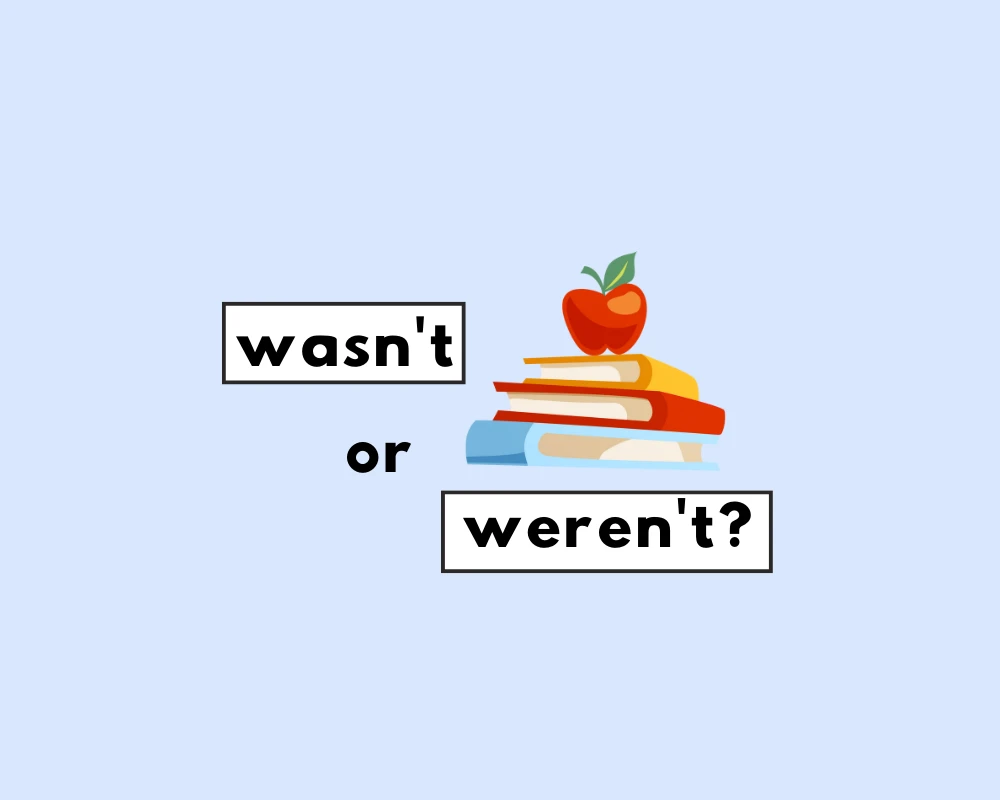Contents
Toggle
Is it ‘if I wasn’t’ or ‘if I weren’t’ ?
Is it ‘wasn’t it’ or ‘weren’t it’? A pair that are ‘same same, but different’. Let’s take a closer look at the question of when should you use wasn’t and weren’t?
A closer look: wasn’t and weren’t
Compare these sentences:
The movie wasn’t as exciting as I had hoped it would be.
The animals at the zoo weren’t very active during the hot afternoon.
What’s deducible from the above sentences? The sentence subjects (in bold) uses wasn’t when the subject is singular and weren’t when the subject is plural. If we try and do the reverse, it sounds weird:
The movie weren’t as exciting as I had hoped it would be.
The animals at the zoo wasn’t very active during the hot afternoon.
This is the rule of subject verb agreement: verbs must take after the number of subjects in a sentence. So, as a general rule, use wasn’t when the subject is singular, i.e., when speaking in the first person or third-person singular, and weren’t for plural subjects and in the second-person.
“Wasn’t” / “weren’t”, used in sentences
| Examples: wasn’t (in sentences) |
|---|
| I wasn’t aware of the new policy that had been implemented. The concert wasn’t cancelled despite the heavy rain. He wasn’t able to finish the project on time due to technical difficulties. She wasn’t happy with the service she received at the hotel. The book wasn’t available at the local bookstore, so I had to order it online. |
| Examples: weren’t (in sentences) |
|---|
| The shoes I wanted weren’t available in my size at the store. The plans for the weekend weren’t finalized yet, so we’re still deciding. They weren’t convinced by his explanation and asked for further clarification. The animals at the zoo weren’t very active during the hot afternoon. The instructions weren’t clear, so I had to ask for assistance. |
Are there any exceptions?
As expected, there are exceptions to the rule, I mean, it’s English grammar we’re talking about. Fortunately, the exception in this case isn’t that complicated, and it has to do with what’s called the subjunctive mood in grammar. The subjunctive mood expresses “wishes, proposals, suggestions, or imagined situations”. To say it in plainer English, basically anything that’s not current reality is in the subjunctive mood, which uses weren’t even when the subject is singular. Take a look:
If it weren’t for the rain, I would have gone to the beach today.
If he weren’t at work we could’ve gone out for dinner.
While it doesn’t necessarily sound incorrect to use wasn’t in either of the above sentences, to follow the subjunctive mood, when speaking in counterfactuals use weren’t.
Sentences with weren’t (in the subjunctive mood)
| Examples: weren’t (in the subjunctive mood) |
|---|
| If he weren’t so shy, he would easily make new friends. I wish I weren’t feeling so tired today. If it weren’t for your support, I wouldn’t have been able to succeed. She speaks as though she weren’t afraid of anything. If it weren’t for the rain, we could have gone for a walk. |
Keep on reading. We encourage it!
- What is the verb ‘to be’?
- What are Auxiliary Verbs?
- What’s a Participle?
- What are Regular and Irregular Verbs?
- When is it Correct to Use There Is vs There Are?
- What Are the Types of Verbs?
Sources
- Merriam-Webster, “Getting in the Subjunctive Mood” Accessed on August 4, 2023.










